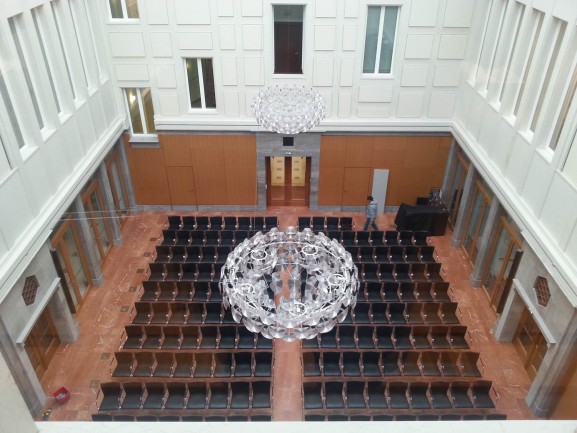Organised by: Robert Bosch Foundation and Documenta – Centre for Dealing with the Past
25 – 27 November 2013 Berlin, Germany
At the invitation of Vesna Teršelič from Documenta, Zagreb, Nenad Vukosavljević and Adnan Hasanbegović participated as CNA representatives at a series of round tables organised in Berlin at the offices of the Robert Bosch Foundation. The event planned for three round tables:
Day 1: Education on Dealing with the Past
Day 2: Cooperation between Museums, Memorials, Documentation Centres, Universities and Civil Society Organisations
Day 3: Joint Activities to Promote the Right to Truth, Justice, Reparation and Guarantees of Never Again
The participants were some thirty representatives of civil society organisations, museums, universities, memorial and documentation centres from Germany, Croatia, BiH, Serbia, Kosovo, Denmark, the Netherlands, Poland, Montenegro, and Slovenia.
The topics, mostly thought-provoking and inspirational for discussion, dealt with exchanging experience and dilemmas, as well as the key problems we face in our work. The somewhat different fields of activity of the present organisations expanded the overall topic, but also contributed to the diversity of approaches to problem solving.
Considerable attention was devoted to the former Yugoslavia as a region that during the 1990s had one war more than the other European countries. Apart from experiences of war, we also discussed the experience of societies with totalitarian and repressive communist regimes in their past.
The observations contributed by CNA mostly revolved around the fact that we see reconciliation and peace building as the basis and objective of the process of dealing with the past, and that we see the development of a culture of memory as a warning about political violence from the past. We also spoke about the complexity of the processes for establishing a culture and policy of memory currently under way in the former Yugoslavia given the national and nationalistic tendencies of representing exclusively own narratives as relevant and correct.
I would particularly emphasise the thoughts of some participants who talked about the need for a culture of memory that would overcome the concepts of war victors and losers and offer an inclusive position towards all stakeholders through a critical approach to past violence with as little ideological framing as possible.
Among those seriously working on social memory, it seems easy to reach a consensus on the desired results and social effects of the process of dealing with the past. In terms of the choice of avenues, evident differences between the opposed concepts of retributive and restorative justice remain unresolved. Apart from that, CNA also has experience that achievements in working with war veterans are built through patient and often invisible work on non-formal education programmes and building capacities for reconciliation actions that only years later grow in scope and quality to attract a lot of attention.
The third day focused on the initiative of Documenta to form an alliance or network of organisations at the European level that would, among other things, participate in organising a global international conference at the end of 2014. We discussed a draft agenda with proposed topics such as: The right to justice and knowledge of historical facts, Ensuring that new generations learn history based on facts, Joint advocacy of the right to justice, reparation and guarantees of never again…
Many open questions regarding the conference remained, but there is evident interest and a sincere desire for it to be organised.
As the title suggested, this event served for establishing contacts among organisations through exchanging ideas and possible joint activities, something we also made use of.
Adnan Hasanbegović
